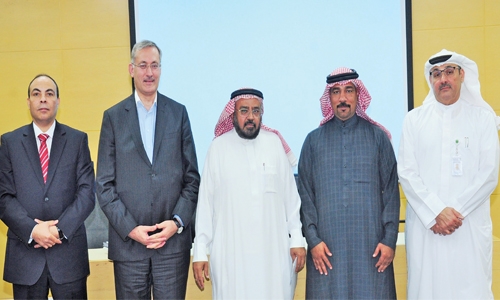AGU’s study on water resources in KSA
Manama : A study titled “Assessment of Sustainability of Water Resources Management in the Kingdom of Saudi Arabia” recently discussed at Arabian Gulf University (AGU) affirmed that Saudi faces many challenges in the management of water resources, especially following the increase in municipal water consumption due to the growing population and the improved standard of living, which contributed to increasing the rate of individual water consumption and agricultural water use.
Agriculture has become a source of investment for many businessmen due to large subsidies provided by the state to the agricultural sector, which led to an increase in cultivated areas.
In his thesis, which he discussed as part of the requirements for obtaining a master’s degree in Water Resources Management at the Department of Natural Resources and Environment at the College of Graduate Studies, researcher Sami Ibrahim Al-Abboud said that the main challenge facing water management and planning in Saudi Arabia is balancing water availability and usage, i.e., reducing the gap between supply and demand, on a long-term basis in the face of rising demand, at the lowest financial, economic and environmental cause, without harming social and economic development.
Bridging the gap between groundwater extraction rates and rates of its natural recharge are of the most important challenges facing the Kingdom in his consideration. He called for a balance between available resources and their demand.
“This will require strict and effective demand management measures, maximum utilisation of non-conventional water resources, and the conservation, sustainability and protection of water resources. This is to be done through the conservation of non-renewable water resources, comprehensive coverage of the water and sanitation services, the rationing of water consumption in all uses, and the development of productive water resources,” he pointed out.
The research, co-supervised by Professor Waleed Zubari and Associate Professor Alaa Elsadek, indicated that the current water management system in Saudi Arabia focuses on supply management, which contributes significantly to the depletion of groundwater and energy sources. It also increases costs as well as economic, financial and environmental issues.
In order to address the accelerated demand, a number of feasible management options were proposed for decision makers in the Eastern Province of the Kingdom focusing on demand management and increase of efficiency. These options were evaluated in terms of effectiveness in raising the efficiency and sustainability of water sector management using a dynamic model that was developed for the water management system in the region, according to the study.
Al-Abboud said these options intend to reduce individual consumption by raising water awareness for consumers, using guiding tools, reviewing the tariff system, reducing leaks in the public municipal network, in addition to increasing the efficiency of irrigation in agriculture, the collection and treatment of wastewater and its reuse in agriculture.
Related Posts

